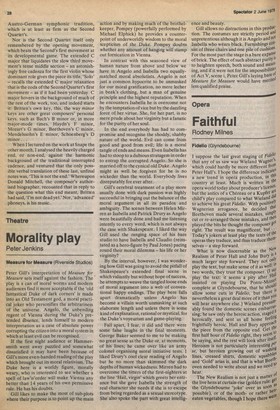Theatre
Morality play
Peter Jenkins
Measure for Measure (Riverside Studios) Peter Gill's interpretation of Measure for Measure sets itself against the fashion. The play is a can of moral worms and modern audiences find it more acceptable if the 'old fantastical Duke of dark corners' is made into an Old Testament god, a moral practical joker who personifies the arbitrariness of the universe. Angelo, the unbending regent of Vienna 'during the Duke's pretended absence, lends himself to modern interpretation as a case of absolute power corrupting the citizen into a moral system in which at least evil can be recognised.
If the first night audience at Hammersmith went away puzzled and somewhat dissatisfied it may have been because of Gill's more even-handed reading of the play which brought out its moral relativism. The Duke here is a worldy figure, morally weary, who is interested to see whether a spell of law'n'order will make Vienna any better than 14 years of his own permissive rule. He has his doubts.
Gill likes to make the most of sub-plots where their purpose is to point up the main action and by making much of the brothelkeeper, Pompey (powerfully performed by Michael Elphick) he provides a counterpoint of underworldly wisdom to the moral scepticism of the Duke. Pompey doubts whether any amount of hanging will stamp out fornication in Vienna.
In contrast with this seasoned view of human nature from above and below we have in Angelo and Isabella two equallymatched moral absolutists. Angelo is not just a common hypocrite to be unmasked for our moral gratification, no mere lecher in beak's clothing, but a man of genuine principle and the highest reputation. When he encounters Isabella he is overcome not by the temptation of vice but by the dazzling force of her virtue. She, for her part, is no mere prude about her virginity but a fanatic for the purity of her soul.
In the end everybody has had to compromise and recognise the shoddy, shabby nature of the world. Evil can come from good and good from evil; life is a moral tangle of ends and means. Even Isabella has had to stoop to a dubious stratagem in order to entrap the corrupted Angelo. So she is married off to the cynical old Duke. Angelo might as well be forgiven for he is no wickeder than the world. Everybody lives disreputably for ever after.
Gill's cerebral treatment of a play more usually done with dark passion was highly successful in bringing out the balance of the moral argument in all its paradox and ambiguity. The scenes between Helen Mirren as Isabella and Patrick Drury as Angelo were beautifully done and had me listening intently to every word, which is not always the case with Shakespeare. I liked the way Gill used the ranging space of his bare studio to have Isabella and Claudio (reinstated as a hero-figure by Paul Jones) pacing round their moral dilemma — his life or her virginity?
By the interval, however, I was wondering how Gill was going to avoid the pitfall of Shakespeare's extended final scene in which valiantly but without hope of success, he attempts to weave the tangled loose ends of moral argument into a web of conventional happy endings. The play here falls apart dramatically unless Angelo has become a villain worth unmasking at such elaborate length and unless there is some kind of explanation, rational or mystical, for the Duke's voyeurism and game-playing.
Fall apart, I fear, it did and there were some false laughs in the final moments. George Baker seemed to me to be making no great sense as the Duke or, at moments, of his lines; he came over like an army colonel organising moral initiative tests. I liked Drury's cool clear reading of Angelo but he no more than skimmed the dark depths of human wickedness. Mirren had to overcome the titters of the first-nighters at the line 'Hail, virgin' which greets her entrance but she gave Isabella the strength of real character she needs if she is to escape from being regarded as a sexual stereotype. She also spoke the part with great intellig ence and beauty. Gill allows no distractions in this prodtIc' tion. The costumes are strictly period and unpretentious although it is Angelo and ri°1 Isabella who wears black. Furnishings con' sist of three chairs and one pile of cushions. For the most part the stage is a bare expans.c of brick. The effect of such abstract purity Is to heighten speech, both sound and mean' ing, and if it were not for the impossibilities of Act.V, scene i, Peter Gill's laying bare °f Measure for Measure would have merited less qualified praise.






































 Previous page
Previous page